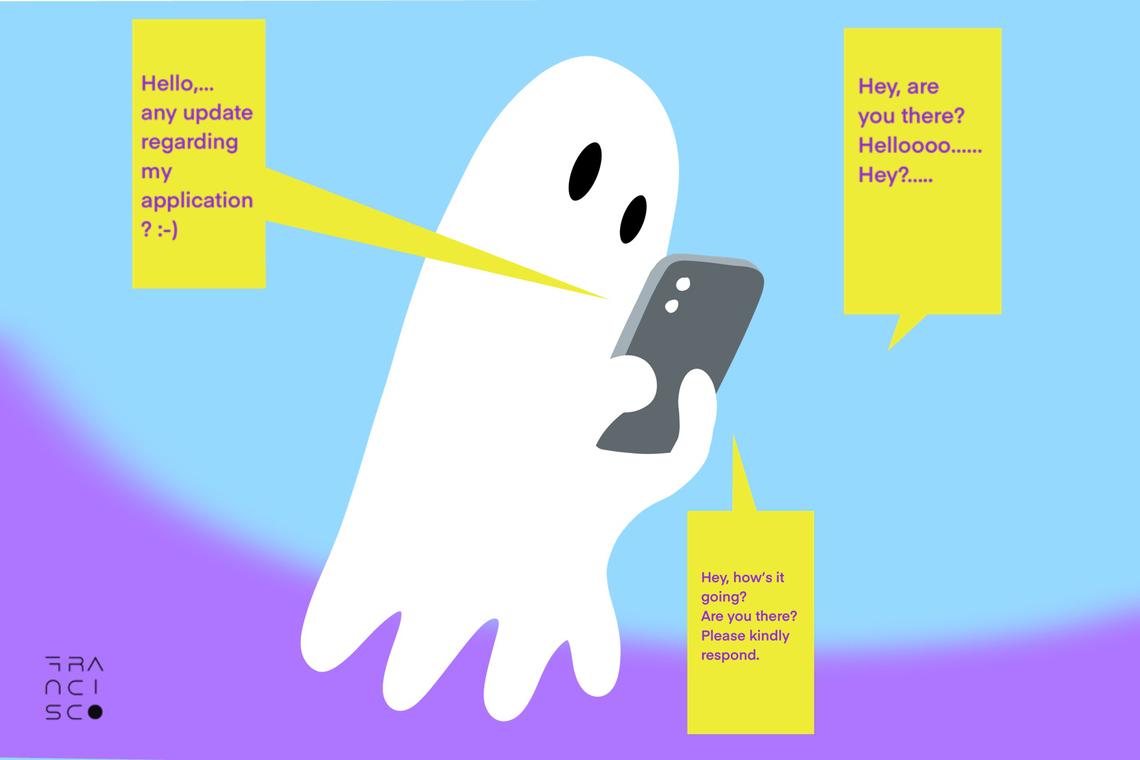SINGAPORE – You are not alone if you have been ghosted by recruiters again and again during your job hunt.
That frustrating silent treatment – where recruiters never get back – is something job seekers know all too well.
User experience designer Mr Ng, who prefers to be known by his last name only, has applied for more than 130 jobs in the past six months and heard back from only a handful of recruiters.
His hopes were raised when these friendly recruiters asked about his work experience and salary expectations in the first few calls, sounding like they had found a “lobang” (good deal) for him. But none has come back to close the loop.
“It felt like I wasn’t good enough to get a reply or an update from them,” the 29-year-old said.
A LinkedIn poll conducted by recruitment agency Robert Walters Singapore saw 88 per cent of its respondents saying that they are often ignored or ghosted.
More than 300 people took part in the poll from May to June.
Dr Chong Sinhui, an assistant professor in management at Nanyang Technological University, said that the candidate ghosting phenomenon has become more pronounced given the exponential increase in the volume of job applications enabled by digitised submission systems.
The sheer volume makes it very difficult for both candidates and recruiters to maintain customised or personalised communication, she said.
Job portals with features like “easy apply” and algorithm-driven job recommendations offer greater convenience to candidates, Dr Chong said. But they could also lead some recruiters to think that they are less obliged to respond to candidates since many are mass applying.
Some companies also think they will not cross paths with unsuccessful applicants again, and thus lack protocols to keep candidates informed, she added.
Recruiters’ pain
Recruiter Mr Loh, who prefers to be known by his last name only, said he understands candidates’ frustration when they are not given a sense of closure, since he was once an active job applicant too.
But having joined the recruitment industry for a year, he said it is unrealistic to respond to every applicant given the overwhelming volume.
In his case, he usually manages 10 job postings at a time, and for each opening, he has to speak to at least 30 applicants to shortlist five to 10 suitable candidates for his corporate clients.
Filling an urgent role takes about two weeks, while the challenging ones can take him up to nine months, and he gets a commission only when there is a successful match.
“If everyone can exercise a bit of empathy… you understand that my job is not easy and I understand that the applicant’s (job search) is not easy, I think the world will be much better,” Mr Loh said.
He added that applicants must also manage their expectations, since the job market has become increasingly competitive with overall improvement in candidates’ qualities.
The competition is more keen with many employers recruiting less actively amid external uncertainties and internal cost-cutting pressure, said Ms Joan Yip, a consultant from recruitment agency Hays.
Application volume per role has also surged due to layoffs and career transitions, she added.
On candidate ghosting, she said job applicants deserve to be in the know, and she will try her best to close the loop.
“Some may fall through the cracks unintentionally, but we genuinely do our best. It is a small but important gesture that helps maintain trust and professionalism – which goes a long way,” she said.
The Straits Times contacted several popular employers in Singapore to ask how they manage the huge number of applications they receive, but most declined to comment on the record.
Dr Paul Lim, a senior lecturer of organisational behaviour and human resources at Singapore Management University, said candidate ghosting is the product of the power dynamics between companies and job seekers.
“If it’s an employer’s market, then the employer is king,” he said. In this case, companies which prioritise efficiency can choose not to respond to unsuccessful candidates, since it is a “nice thing to do”, but not necessarily “the right thing to do”.
“Some people might say it doesn’t take a lot, but it is additional work for them,” he said.
The reverse could also happen in a candidates’ market, where job seekers ghost employers who invite them for subsequent interviews or offer them a job.
In an ideal world, Dr Lim said both parties should honour each other’s time and effort.
For job seekers, politely declining an offer can leave a good impression, which helps with their future career moves. For employers, keeping unsuccessful candidates posted can improve their reputation, which is crucial for talent attraction, he said.
Dr Lim also drew parallels between a job search and online dating, where ghosting is also prevalent.
“If the person doesn’t contact you, do you wait day and night for the person to contact you?” he asked.
His advice to candidates is: If a company is not interested in them, instead of waiting for an answer, continue their search actively until they receive an offer.
“If they come back and say that they are still interested, but you have an interview (elsewhere), it raises your value.”
Check out the Headstart chatbot for answers to your questions on careers and work trends.
